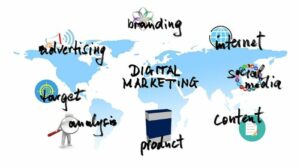Small businesses often struggle to compete with larger companies that have more extensive resources, established brand recognition, and a significant market share. However, digital marketing has leveled the playing field, offering small businesses the opportunity to reach their target audience effectively and compete with the big players in their industry. Digital marketing encompasses a wide range of strategies and techniques, including search engine optimization (SEO), pay-per-click (PPC) advertising, social media marketing, email marketing, and content marketing. By leveraging these tools, small businesses can build a robust online presence, engage with their customers, and drive revenue growth.
According to a recent survey by Clutch, 81% of small businesses invest in some form of digital marketing. The study also found that small businesses that invest in digital marketing are three times more likely to achieve revenue growth than those that don’t. Digital marketing can help small businesses in several ways, including:
- Increasing brand awareness: Digital marketing allows small businesses to reach a wider audience and increase brand recognition. By creating compelling content and engaging with customers on social media, small businesses can build a loyal following and increase their visibility online.
- Driving traffic to their website: Small businesses can use SEO and PPC advertising to drive traffic to their website and increase their chances of converting visitors into customers. By optimizing their website for search engines and targeting the right keywords, small businesses can attract high-quality leads to their site.
- Generating leads and sales: Digital marketing can help small businesses generate leads and sales by targeting the right audience with the right message. By creating targeted ads and personalized content, small businesses can increase their chances of converting leads into customers.
In the following sections, we’ll explore some of the most effective digital marketing strategies for small businesses and provide tips on how to implement them successfully.
Digital Marketing Statistics for Small Businesses
Before we dive into the specifics of digital marketing for small businesses, let’s take a look at some of the most recent statistics regarding the industry. According to the 2021 State of Small Business Report by Guidant Financial, digital marketing is the most popular marketing channel for small businesses, with 47% of respondents listing it as their preferred marketing strategy. The report also found that the top benefits small businesses receive from digital marketing are increased sales (28%), improved customer engagement (25%), and increased brand awareness (25%).
Another study by Hootsuite found that social media advertising is the most popular form of digital advertising for small businesses, with 92% of respondents using it to market their products or services. The study also found that email marketing is the most effective digital marketing strategy, with an ROI of 42:1.
These statistics demonstrate the effectiveness of digital marketing for small businesses and highlight the importance of developing a comprehensive digital marketing plan.
Understanding Your Target Audience
One of the essential elements of successful digital marketing is understanding your target audience. Knowing who your customers are, what they want, and how they prefer to engage with your brand can help you create targeted marketing campaigns that resonate with them.
To understand your target audience, you need to conduct market research and gather data on your customers’ demographics, interests, behavior, and pain points. You can use various tools and techniques, such as surveys, focus groups, customer feedback, and website analytics, to gather this information.
Once you have a clear understanding of your target audience, you can create buyer personas that represent their characteristics and preferences. These personas can help you tailor your marketing messaging, content, and channels to better engage with your customers.
Creating Your Digital Marketing Plan
Creating a digital marketing plan is crucial for small businesses looking to succeed in the online world. A digital marketing plan outlines the strategies, tactics, and goals for your digital marketing efforts and provides a roadmap for implementing them.
To create a digital marketing plan, you need to follow these steps:
Define your target audience: As we discussed earlier, understanding your target audience is critical to creating an effective digital marketing plan.
Set your goals: Your goals should be specific, measurable, achievable, relevant, and time-bound (SMART). For example, your goal could be to increase website traffic by 25% in the next six months.
Choose your digital marketing channels: Based on your target audience and goals, select the channels that are most appropriate for your business. For example, if your target audience is primarily on social media, focus on social media marketing.
Develop your messaging and content: Your messaging and content should be tailored to your target audience and aligned with your goals. Develop a content calendar that outlines the types of content you will create and when you will publish them.
Implement and measure your plan: Once you have developed your plan, it’s time to implement it and track your results. Use analytics tools to measure your performance and adjust your plan as needed.
Search Engine Optimization (SEO) for Small Businesses
Search engine optimization (SEO) is the practice of optimizing your website to rank higher in search engine results pages (SERPs). SEO is a crucial component of digital marketing for small businesses because it can help them attract high-quality organic traffic to their website and increase their chances of converting visitors into customers.
To optimize your website for SEO, you need to follow these best practices:
Keyword research: Identify the keywords and phrases that your target audience is searching for and incorporate them into your website content.
On-page optimization: Optimize your website’s title tags, meta descriptions, headers, and content to make it more search engine friendly.
Link building: Generate high-quality backlinks to your website from reputable sources to improve your website’s authority and credibility.
Mobile optimization: Ensure that your website is mobile-friendly and optimized for mobile devices.
Local SEO: If you have a local business, optimize your website for local search by including your address, phone number, and hours of operation.
Pay-per-Click (PPC) Advertising for Small Businesses
Pay-per-click (PPC) advertising is a form of digital advertising where advertisers pay a fee each time someone clicks on one of their ads. PPC advertising can be an effective way for small businesses to drive targeted traffic to their website and increase their chances of converting visitors into customers.
To succeed in PPC advertising, you need to follow these best practices:
Keyword research: Identify the keywords and phrases that your target audience is searching for and create targeted ads that align with their search intent.
Ad copy: Write compelling ad copy that highlights the benefits of your product or service and encourages users to click on your ad.
Landing pages: Create landing pages that are optimized for conversion and aligned with your ad copy.
Budget management: Set a budget for your PPC advertising and monitor your spend to ensure that you are getting a positive ROI.
A/B testing: Test different ad copy, landing pages, and targeting options to optimize your PPC campaigns.
Social Media Marketing for Small Businesses
Social media marketing is the practice of using social media platforms like Facebook, Twitter, and Instagram to promote your brand and engage with your customers. Social media marketing can be a powerful tool for small businesses because it allows them to reach a large audience and build a community around their brand.
To succeed in social media marketing, you need to follow these best practices:
Choose the right platforms: Select the social media platforms that are most relevant to your target audience and align with your marketing goals.
Develop a content strategy: Create a content calendar that outlines the types of content you will create and when you will publish them. Your content should be engaging, informative, and aligned with your brand.
Engage with your audience: Respond to comments and messages promptly, and participate in conversations related to your industry or niche.
Use social media advertising: Use social media advertising to reach a larger audience and promote your products or services.
Measure your performance: Use analytics tools to track your social media performance and adjust your strategy as needed.
Email Marketing for Small Businesses
Email marketing is the practice of sending promotional emails to your subscribers to promote your brand, products, or services. Email marketing can be an effective way to nurture leads, build customer loyalty, and drive revenue growth for small businesses.
To succeed in email marketing, you need to follow these best practices:
Build a quality email list: Build an email list of subscribers who have opted-in to receive your emails and are interested in your brand.
Segment your email list: Segment your email list based on your subscribers’ interests, behavior, and demographics to create targeted email campaigns.
Create engaging content: Create compelling email content that resonates with your subscribers and encourages them to take action.
Optimize your emails for mobile: Ensure that your emails are mobile-friendly and optimized for different devices.
Measure your performance: Use analytics tools to track your email performance and adjust your strategy as needed.
Content Marketing for Small Businesses
Content marketing is the practice of creating valuable, informative, and engaging content to attract and retain a target audience. Content marketing can be an effective way for small businesses to build their brand, establish thought leadership, and drive traffic to their website.
To succeed in content marketing, you need to follow these best practices:
Develop a content strategy: Create a content calendar that outlines the types of content you will create and when you will publish them.
Identify your target audience: Understand your target audience’s interests, pain points, and preferences to create content that resonates with them.
Create quality content: Create high-quality content that is informative, engaging, and aligned with your brand.
Promote your content: Use social media, email marketing, and other digital marketing channels to promote your content and increase its visibility.
Measure your performance: Use analytics tools to track your content performance and adjust your strategy as needed.
Tracking and Measuring Your Digital Marketing Efforts
Tracking and measuring your digital marketing efforts is essential for understanding what’s working and what’s not. By monitoring your performance, you can adjust your strategy and optimize your campaigns for better results.
To track and measure your digital marketing efforts, you need to follow these steps:
Set up analytics tools: Set up tools like Google Analytics to track your website traffic, conversions, and other key metrics.
Define your KPIs: Define the key performance indicators (KPIs) that are most relevant to your business and track them regularly.
Analyze your data: Analyze your data to identify trends, patterns, and areas for improvement.
Adjust your strategy: Use your data to adjust your digital marketing strategy and optimize your campaigns for better results.
Common Mistakes to Avoid in Digital Marketing for Small Businesses
While digital marketing offers numerous benefits for small businesses, there are also some common mistakes that businesses should avoid. Here are some of the most common mistakes to avoid:
Focusing on quantity over quality: Instead of creating a large volume of low-quality content, focus on creating high-quality content that resonates with your target audience.
Neglecting mobile optimization: With more people accessing the internet through mobile devices, it’s essential to optimize your website and digital marketing campaigns for mobile.
Ignoring analytics: Failing to track and analyze your digital marketing performance can lead to missed opportunities and wasted resources.
Overlooking your website’s user experience: Your website’s user experience plays a crucial role in converting visitors into customers. Ensure that your website is user-friendly and easy to navigate.
Failing to adapt: The digital marketing landscape is constantly evolving, and businesses must be willing to adapt their strategies to stay ahead of the curve.
Conclusion: How Digital Marketing Can Help Small Businesses Grow and Succeed
Digital marketing offers small businesses numerous benefits, from increasing brand awareness and driving traffic to generating leads and sales. By understanding your target audience, creating a comprehensive digital marketing plan, and leveraging various digital marketing channels, small businesses can compete with larger companies and thrive in today’s competitive market.
To succeed in digital marketing, small businesses must focus on quality over quantity, optimize their campaigns for mobile, track and measure their performance, prioritize user experience, and be willing to adapt to the changing digital landscape. By following these best practices, small businesses can transform from zero to hero and achieve success in the online world.




